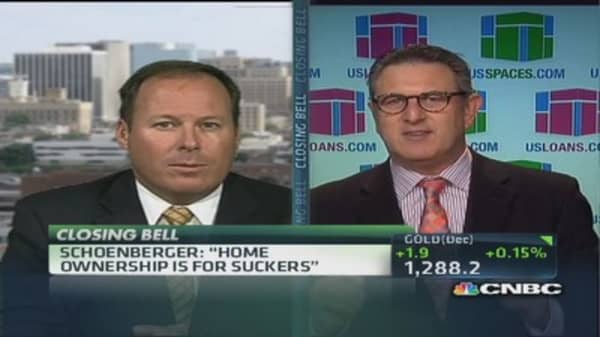The two critical metrics real-estate enthusiasts like to review are the monthly existing- and pending-home-sales reports, which were horribly weak when both were released a few weeks ago.
(Read more: Why the Fed can 't save housing)
The existing-home-sales report showed a 1.9-percent decline for the month of September and August was revised to the downside, which showed a 0.0-percent change in what is typically the last great month of real-estate buying. More importantly, sales in three of the report's four regions were lower in September. The only gain occurred in the west, which was a fractional gain at best.
If you think those stats are bad, then you haven't analyzed the pending-home-sales report. This report, which was developed by the National Association of Realtors, has been a colossal failure recently.
For September, the U.S. experienced a 5.6-percent decline in pending-home-sale activity and has now declined for four months in a row. It's down 1.2 percent year-over-year, which happens to be the first negative reading since the spring of 2010.
(Read more: Jobs report is bad for housing)
I'm sorry, but who was it who said housing is in recovery mode? It's clearly not, and the evidence points to a very fragile outlook for a sector that many say is the backbone for economic strength in this country.
It's inevitable the Federal Reserve will begin to taper its bond-buying program sometime in the future. And, when it does, home buyers will be wishing they were never suckered into purchasing property.
The Fed has approximately $1.45 trillion of mortgage bonds on its balance sheet. Now, this expansion of mortgage holdings has been great for increasing home prices — as the recent Case-Shiller reports have shown us — but, the outcome will be seriously detrimental to those who think buying a home is a "great" investment.
Simply take a look at the average home price in America: $180,000. Looking at the Fed's balance sheet, you can ascertain the Fed has purchased the equivalent of 8.1 million units (homes), which is approximately 6.2 percent of the housing stock.
(Read more: America's top housing market)
Once the Fed begins tapering its mortgage-bond holdings, guess what is going to happen to home prices? You're correct if you say they are going lower.
In addition, as Robert Shiller, co-creator of the aforementioned Case-Shiller Index, recently said: "Housing traditionally is not viewed as a great investment. It takes maintenance, it depreciates, it goes out of style. All of those are problems."
If you wish to incorporate the higher maintenance costs and upcoming increases in property-tax bills, you can honestly say that it may be best to head for the hills when a realtor suggests you purchase a home.
Renting, like cash, is king these days. Just something to keep in mind as we approach uncertain days ahead. Sometimes it's best to shift your dreams to make conservative personal economic sense for your household balance sheet.
Read more:
The housing stat you need to watch
Housing's top turnaround towns may surprise you
Goldman Sachs warns on "large correction" in Canadian housing
— By Todd M. Schoenberger
Todd M. Schoenberger is the founder and managing partner of LandColt Capital LP, and serves as Portfolio Manager of the LandColt Onshore and Offshore Funds. Follow him on Twitter @TMSchoenberger.




